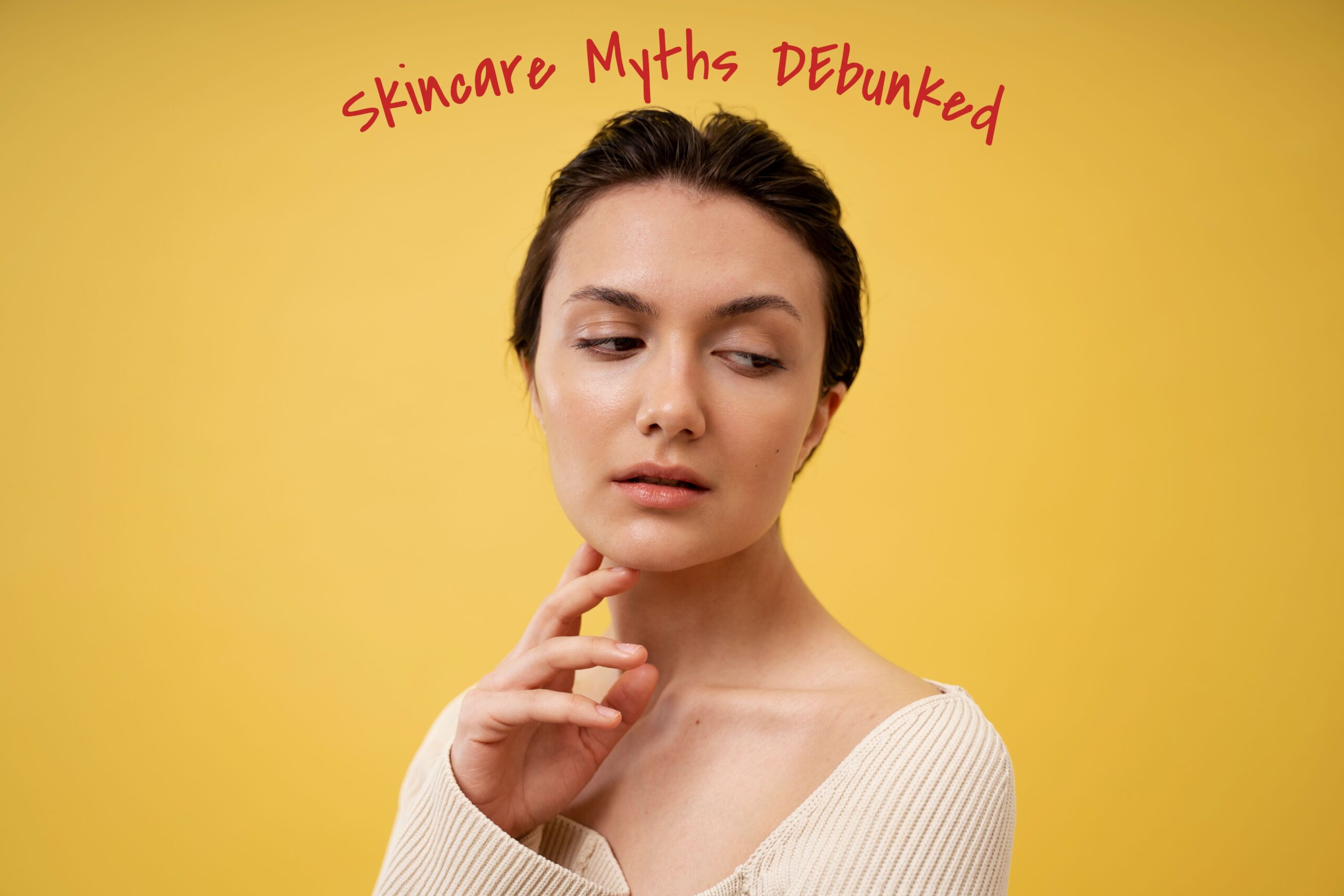The world of skincare is filled with advice, tips, and tricks promising flawless skin. However, not all of this information is accurate or beneficial. Many skincare myths can lead to ineffective routines or even damage the skin. In this comprehensive guide, we’ll debunk some of the most common skincare myths, highlight evidence-based practices, and separate myths from facts.
Common Misconceptions in Skincare
Myth 1: Oily Skin Doesn’t Need Moisturizer
One of the most pervasive myths is that oily skin doesn’t require moisturizer. This misconception stems from the belief that adding more moisture will only exacerbate oiliness and lead to breakouts. However, skipping moisturizer can actually worsen the problem. When the skin is deprived of moisture, it can produce even more oil to compensate, leading to an oily yet dehydrated complexion.
Fact: Oily skin still needs hydration. Opt for lightweight, non-comedogenic moisturizers that provide hydration without clogging pores. Ingredients like hyaluronic acid and glycerin are excellent choices for oily skin.
Myth 2: Expensive Products Are Always Better
Many people believe that high-end skincare products are inherently superior to their drugstore counterparts. While some luxury brands offer effective products, price isn’t always indicative of quality. Many affordable skincare brands provide highly effective formulas backed by scientific research.
Fact: Effectiveness isn’t determined by price. Look for products with proven active ingredients, regardless of their price point. Research the ingredients and reviews to make informed choices.
Myth 3: You Need to Change Your Skincare Routine Frequently
The belief that frequently changing skincare products is necessary to prevent your skin from becoming “used to” them is another common myth. In reality, consistency is key to seeing results. Frequently switching products can disrupt your skin’s balance and cause irritation.
Fact: Stick to a consistent routine to allow products to work effectively. Give new products at least 4-6 weeks before assessing their efficacy.
Myth 4: Natural Ingredients Are Always Better
The trend towards natural and organic skincare products has led many to believe that natural ingredients are always safer and more effective. However, not all natural ingredients are beneficial, and some can even cause irritation or allergic reactions.
Fact: Both natural and synthetic ingredients can be beneficial or harmful. It’s important to focus on the specific properties and efficacy of the ingredients rather than their origin.
Myth 5: Sunscreen Is Only Necessary on Sunny Days
Many people skip sunscreen on cloudy or winter days, believing that UV protection is only necessary in direct sunlight. However, UV rays can penetrate clouds and cause damage year-round.
Fact: Sunscreen should be worn every day, regardless of the weather. Choose a broad-spectrum SPF of at least 30 to protect against both UVA and UVB rays.
Evidence-Based Practices
While myths can mislead, evidence-based skincare practices provide a reliable path to healthy skin. Here are some scientifically supported tips to enhance your skincare routine:
1. Double Cleansing
Double cleansing involves using an oil-based cleanser followed by a water-based cleanser. This method effectively removes makeup, sunscreen, and impurities without stripping the skin.
Why It Works: The oil-based cleanser dissolves makeup and excess sebum, while the water-based cleanser removes sweat, dirt, and remaining residue. This thorough cleansing method helps prevent clogged pores and breakouts.
2. Regular Exfoliation
Exfoliation removes dead skin cells, promoting cell turnover and improving skin texture. Both physical and chemical exfoliants can be effective when used correctly.
Why It Works: Exfoliation helps to unclog pores, reduce the appearance of fine lines, and even out skin tone. Chemical exfoliants like AHAs and BHAs can penetrate deeper and provide more consistent results compared to physical scrubs.
3. Using Active Ingredients
Incorporating active ingredients such as retinoids, Vitamin C, and niacinamide can address specific skin concerns and improve overall skin health.
Why It Works: Active ingredients have scientifically proven benefits. For example, retinoids promote cell turnover and reduce wrinkles, Vitamin C brightens and protects against free radical damage, and niacinamide soothes inflammation and improves skin barrier function.
4. Hydration
Proper hydration is crucial for maintaining healthy skin. Hydrating ingredients like hyaluronic acid and glycerin attract and retain moisture in the skin.
Why It Works: Hydration helps to maintain the skin’s barrier function, preventing dryness and irritation. Well-hydrated skin appears plumper and more radiant.
5. Sun Protection
Daily use of sunscreen protects the skin from harmful UV rays, which can cause premature aging, hyperpigmentation, and increase the risk of skin cancer.
Why It Works: Sunscreen protects against UV-induced damage, preventing photoaging and reducing the risk of skin cancer. It is the most effective anti-aging product you can use.
Myths vs. Facts
Let’s break down more myths and the corresponding facts to clear up common misunderstandings.
Myth: Pores Can Open and Close
A widespread myth is that pores can open and close, often perpetuated by claims that steaming opens pores and cold water closes them.
Fact: Pores don’t have muscles to open and close. Steam can help loosen debris within pores, making it easier to cleanse, but it doesn’t change their size. Cold water can temporarily tighten the skin, giving the illusion of smaller pores.
Myth: Toothpaste Can Treat Pimples
Many people apply toothpaste to pimples, believing it will dry them out and speed up healing.
Fact: Toothpaste can cause irritation and dryness, potentially worsening the breakout. Use spot treatments formulated with salicylic acid or benzoyl peroxide for effective pimple treatment.
Myth: Drinking More Water Hydrates the Skin
While staying hydrated is important for overall health, the belief that drinking large amounts of water will directly hydrate the skin is exaggerated.
Fact: While proper hydration supports overall health, it doesn’t directly translate to increased skin hydration. Topical moisturizers and hydrating ingredients are more effective for maintaining skin hydration.
Myth: You Shouldn’t Wear Makeup If You Have Acne
Some believe that makeup worsens acne and should be avoided entirely if you have breakouts.
Fact: Non-comedogenic makeup products are formulated to not clog pores. As long as you thoroughly remove makeup and follow a suitable skincare routine, wearing makeup shouldn’t worsen acne.
Myth: Anti-Aging Products Are Only for Mature Skin
Many people think that anti-aging products are only necessary once visible signs of aging appear.
Fact: Preventative skincare, including anti-aging products, can benefit all ages. Ingredients like antioxidants and sunscreen help protect the skin from early signs of aging.
Conclusion
Understanding the facts behind common skincare myths is essential for maintaining a healthy and effective skincare routine. By debunking these myths and relying on evidence-based practices, you can make informed decisions that benefit your skin in the long run. Remember, consistency and knowledge are key to achieving and maintaining your best skin. Stay informed, trust science, and enjoy the journey to healthier, more radiant skin.

